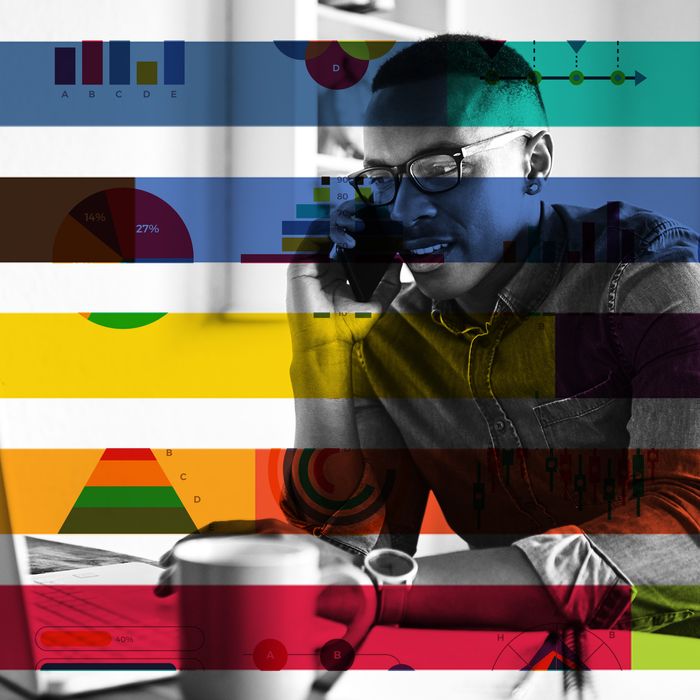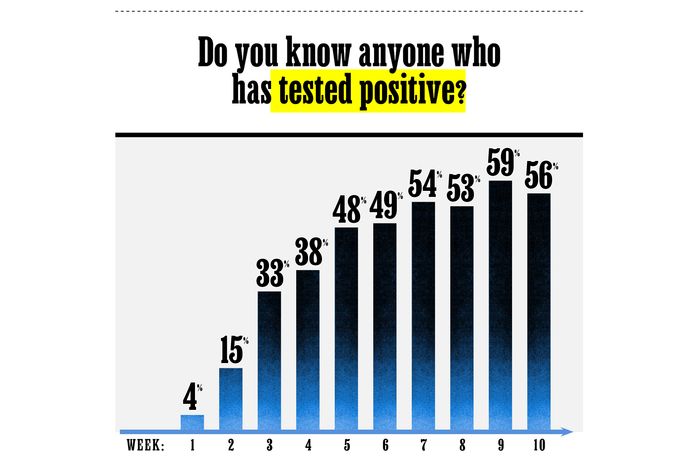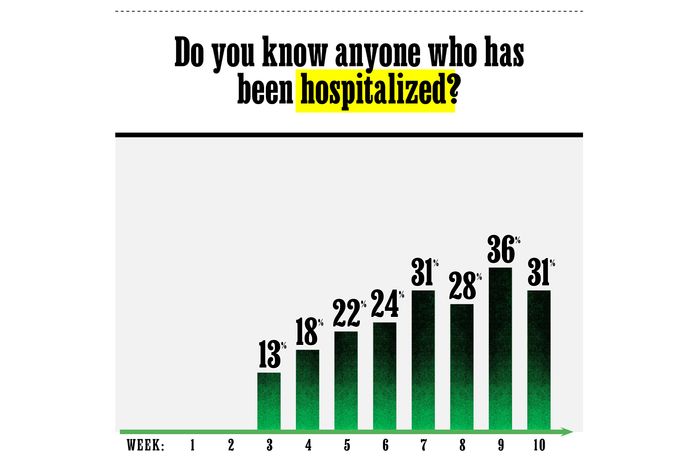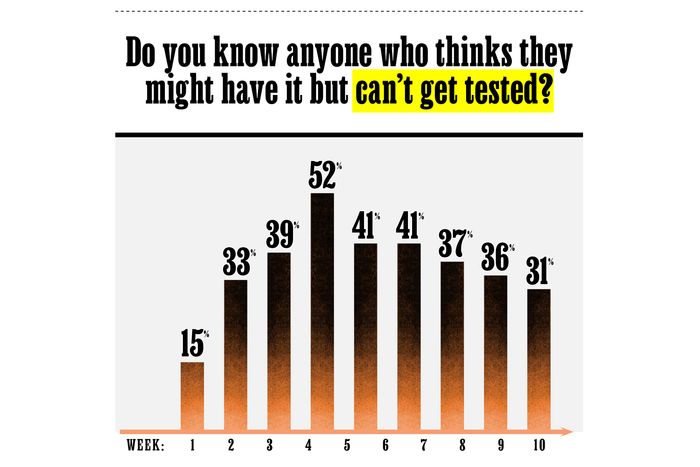
This week, Governor Cuomo extended New York’s stay-at-home order through May 28 for regions in the state that have not met certain criteria for coronavirus decline — including New York City, its suburbs, and the Buffalo region. While more states across the country continued to reopen, and New York, New Jersey, Connecticut, and Delaware announced that state beaches would be open later this month, Mayor de Blasio announced that city beaches would remain closed, and that the NYPD would continue limiting access to Central Park. Here’s how 1,412 New York readers were feeling this week — and how they’re thinking about work. (Note: Graphs show week-over-week responses, all other results are from week ten only.)
How would you describe your emotional state right now?
Very anxious/ scared: 14.5%
Somewhat anxious and/or scared: 34.5%
Concerned: 34%
Slightly concerned: 12%
Totally fine: 5%
Do you, or anyone in your household, fear that your work puts you at significant risk of contracting the virus?
No: 75.2%
Yes: 24.8%
How often are you leaving your home?
Not at all: 8%
Just for essential errands: 82.1%
I still have to leave for work, but I am not making other trips: 7.8%
I’m living my life as normal: 2.1%
Are you sheltering in place somewhere that’s not your primary residence?
No: 89%
Yes: 11%
If so, where are you staying?
A family member’s home: 57%
A significant other’s home: 8%
A short-term rental: 8%
A friend’s home: 5.1%
A second home that you own: 17.5%
Other: 4.3%
Has your employer reduced your pay since the outbreak began?
No: 48.2%
Yes: 16.8%
Not Applicable: 35%
Has anyone in your household applied for unemployment?
No: 82.8%
Yes: 14.5%
They’re trying to apply but can’t get through (site crashing/ phone lines busy): 2.7%
If you’re a New York resident, when do you think New York City will reopen?
June: 6.6%
July: 20%
August: 15.6%
September: 32.5%
October: 6.6%
November and later: 18.8%
How many of the following advances need to be made before you’d feel comfortable returning to public life?
• Comprehensive contact tracing around the country.
• Comprehensive contact tracing in my state.
• Readily available virus tests.
• Readily available antibody tests.
• Temperature checks at the entrances of businesses and offices.
• A vaccine.
The Five Most Common Responses:
Comprehensive contact tracing around the country, comprehensive contact tracing in my state, readily available virus tests, readily available antibody tests, temperature checks at the entrances of businesses and offices, and a vaccine: 16%
Comprehensive contact tracing around the country, comprehensive contact tracing in my state, readily available virus tests, readily available antibody tests, and a vaccine: 9.5%
A vaccine: 7.7%
Readily available virus tests, readily available antibody tests, and a vaccine: 4.7%
Comprehensive contact tracing around the country, readily available virus tests, readily available antibody tests, and a vaccine: 3.9%
Overall Necessity Ranking:
1. A vaccine
2. Readily available virus tests
3. Readily available antibody tests
4. Comprehensive contact tracing around the country
5. Comprehensive contact tracing in my state
6. Temperature checks at entrances of offices and buildings
How has the pandemic made you think differently about work?
“Perhaps, I have become indifferent to work. Work, now, is just work. Working from home has helped me realize how much I resent the instructiveness of work and that I resent how much my employer owns my time and my thoughts. And, certainly, the separation between work and home (my sanctuary) has all but disappeared. Zoom meetings have resulted in staff members and others being in my home — uninvited.”
“I struggle to stay motivated. I work in big law and when I look back at all the weekends, family gatherings, and other aspects of my life that I missed, it makes me wonder: for what? At any moment a life altering event can occur and suddenly all you’re left with are memories. I don’t want those memories to be of my four office walls.”
“I’m a teacher, so it has completely changed the nature of my day. The pandemic has made me hopeful that when we return to school we will phase out some outdated practices and beliefs about education out of necessity. For example, I can’t safely cram 38 desks in my classroom. We will likely need staggered starts and more flexible schedules. A student’s education will be based on outcomes (meeting content standards) not how many hours their butt is in a chair.”
“I am a freelance writer and I haven’t been able to get any work since March. It makes me think I need to … find a new profession? Give up on my dreams? Become an aging camgirl? I don’t even know. Honestly I’m so depressed.”
“It’s only reinforced how I felt about work. I believe work culture only exists to push young people like myself to pour all our energy into being productive, leaving us too strung out to pursue other ventures. The people protesting to go back to work only confirms this fact.”
“I am a religious sister and my community has been unable to conduct our regular services, activities, and events. Our contact with our church member’s is limited to telephone, email, and online services. Though we live a life of study, prayer, and meditation within our community, still our personal contact with our devotees is sorely missed.”
“I work for an ERV [energy recovery ventilation] manufacturer and we’ve never been more relevant or vital than in the pandemic. I’m incredibly proud that we’re working to provide hospitals and makeshift units with ventilation units that provide 100 percent outside air and zero percent cross contamination. Our facility uses this same technology in-house, so the air quality in our building is incredibly sterile. That said, I’m terrified to go back to work despite hating working from home and missing my teammates. I am scared to contract the virus and/or pass it on to family members or teammates. Forgetting the health risks involved, there are serious economic risks in returning to the facility, if our production floor were to have an outbreak we would be shut down and we could not provide ventilation units to hospitals that need them. I guess simply put — I oscillate between pride in my work but terror in the idea of having to leave my home/sanctuary.”
“I’ve come to believe that a six-hour work day or 32-hour work week should be standard. And that the work-life balance as we currently know it is not healthy for anyone.”
“I work in a city where my company is not headquartered. Company-wide work-from-home mandate has opened a lot of opportunities that were once only considered if you were willing to relocate to headquarters. At the same time, it is hard to focus on getting ahead in my career when the world seems to be crumbling around me.”
“I work at a police department in a semi-first-responder role (victim advocate). We have moved 99 percent of our client contacts (we’ve only responded out in person on a couple of critical incidents) to over the phone and work primarily from home. Moving our frontline response — crisis intervention — to over the phone has been challenging as it is more difficult to establish an effective rapport with folks, and offer effective emotional support. It’s really made me consider how much of our communication is via nonverbal cues. I miss being able to interact and serve folks in the midst of the crisis.”
“I’m wondering if I’ll be able to return to it — self-employed piano teacher. The pleasure is in being present in the room with my students. It is not something I want to do online. My sense of loss is acute.”
“I was used to working remotely, with teams scattered all over the place, some of whom you never meet in person. But we always had the ability to come into the office, we had weeks crammed in a conference room on client sites together, we had post-project drinks. When you interact with people exclusively through pre-scheduled time, you lose some of the spontaneity and connection. So I think it’s a positive thing that a lot of people are realizing how much work can be done remotely. I hope that it adds more flexibility, and allows more people into the workforce. (Though there are reasons to fear that women will just be doubly expected to juggle it all and men will take the trash out once a week and call it even, for example.) But I really worry about what happens to some of the human connection aspects, once companies realize they can give up more of their real estate and push folks online.”
“I am happy to have discovered that I’m fully able to do my job remotely, without much of a dent in productivity. I also realize now how much of white-collar work is spent perpetuating a culture. Many methods and habits are unnecessary, from business travel and endless meetings to day-long team building exercises. I’ve never felt more connected to my colleagues than I do now, in spite of interacting with them one-tenth the amount I used to. There is a deep sense of humanity that is emerging in my work culture and that is something I hope we keep centered in the future.”
“I’m (mercifully) about to start a new job after ‘graduating’ from a very fancy Zoomiversity. As of now, my incoming cohort of 300 will be working virtually until October. In Zoom school, I noticed just how much I like those five minutes before class when you set up your notes and chat. That’s the time that made me friends with a lot of people. I worry that this will continue at work and really prevent the opportunities to meet people socially as a new grad in a new place on top of the pressure to network as a way to stay relevant and employed.”
“It has made me question what I want to do with my career. I am only 25 and working an entry level position for a nonprofit. Prior to this, I felt fulfilled by my job. Now, I want something that brings me more joy. I’m feeling stuck and I haven’t even been at my workplace a whole year. I still recognize that I am lucky to have a job, though.”
“I’m scared to work every day. I clean fish tanks, and I’m still having to go into people’s homes. I’m limiting it to one client per day — but it doesn’t feel like enough. I haven’t had a chance to quarantine or been able to get a test since this started. I’m scared of killing people. I’m tired of the president lying to the public. I’m in a low-case state, I can only imagine how bad it is in other places.”
“I am a casino dealer, so this pandemic has really made me incredibly uneasy about returning to work. I make so much contact with so many people every day, and I don’t have health insurance. Nor do I have the trust that my employer wouldn’t fire me for having the temerity to not come to work because I caught a life-threatening virus in their establishment. I just don’t see how my job could be made safe without some way to be absolutely sure that everyone coming into the casino was virus-free, and it’s pretty clear that neither my state or national government is remotely interested in ensuring anything remotely like that. I’m essentially resigned to eventually contracting COVID-19, hoping to survive it, and then being in massive debt and possibly unemployed and homeless for the foreseeable future thereafter.”
“I’m wondering if it’s really necessary to return to life as it was before. I’m a professor, and I’d like to hold class again in person when possible. But everything else I used to go to campus for — meetings, mostly — I certainly don’t need to be there. Beyond that, I’m wondering if this is the break from the job I love that I needed to propel me into retirement.”
“It makes me realize how much I hate working at home. I need that separation of work and home, and I can’t currently get it. I’m desperate to get out of my own home, and I really hate the thought that offices might be a thing of the past once this ends. There’s far less division between work and life when working at home, and it makes me value my free time less because it all sort of bleeds together.”
“I’m a community mental health therapist who works with pregnant people and people parenting kids 0 to 6 years old. Moving to telehealth has been a huge challenge as internet access isn’t available/reliable. It’s also so hard to engage young children for long over video and to work on things like attachment, relationships, and trauma, which is the focus of my work. Plus, it’s emotionally exhausting for us to hold space for these families to talk about all their anxieties and fears about COVID while also experiencing the same things. I used to be in their homes every week for our sessions and there’s no timeline for when we could safely return. It’s changed our program for likely the next 12 to 18 months.”
“Work has been something to latch onto during this time, to keep my brain occupied. At the same time my particular job has never felt less essential, though I’m working harder than ever. I stare at a screen all day, and it’s hard to view that as important when actual lives are at stake.”
How has the pandemic changed your professional goals and plans?
“I wonder what the industry I work in (book publishing) will look like when this is over, and if I’ll be able to make a career move I was hoping to make at the end of this year or early next.”
“Any plans for me to leave my company are on hold. I’m a designer and I’ve worked at five other companies and at every other place I’ve worked had either laid off or furloughed staff.”
“I’m thinking about what kinds of jobs are going to grow and what jobs are going to shrink. My professional goals — environmental law — remain strong, if not reinforced, as I think pandemics, global crises, and climate change are increasingly interconnected.”
“I was already contemplating early retirement. Ironically, if this paves the way to permit more remote work, I might stay in my current work situation. The work is not bad, but having a job, plus excellent benefits, minus a commute — that’s pretty tough to walk away from in 2020.”
“I already feel like I’m aging out of my industry, and now there will be a lot of people looking for work, so I’m really in trouble. I might need to find something else to do.”
“I got my dream job at the end of 2019 and I wonder every day if I’m going to be furloughed or let go, and then what? I’ve wanted this job for years.”
“I waited six years after undergrad to go back to law school after having graduated undergrad at a rocky time … and now I’m graduating law school in a shitstorm. I hope to be able to pay back my loans and work as a lawyer at all.”
“I never want to commute to work again. I’ll take a pay cut to make that happen.”
“I have gone from actively job searching and wanting to advance my career to being happy to just be employed and have bosses who are understanding that I am trying to work with a toddler at home.”
“I have wanted to be a journalist for a long time, but now I am unsure of the path into that industry, given all of the layoffs and furloughs I continue to see happening. I haven’t had the traditional path into journalism and felt like I was just getting my feet under me in this new position, but it is sort of difficult to see a path forward in the short or long term. I have considered potentially trying to shift over into politics, potentially working in a congressional office. I think the pandemic has given me more political aspiration, but I have to figure out if that’s true when we get out on the other side of this thing.”
“I went from one end of the spectrum (childbirth, pregnancy, women’s health) to the other (hospice). It is where I was welcomed and where I can put my skills to good use.”
“My career aspirations are also ‘sheltering in place.’”
“It has made me realize that I shouldn’t wait to look for something that feels more satisfying and fun. Although now all I can do is wait.”
“Before the pandemic hit, I was in the process of leaving my corporate desk job to open a restaurant. HAHAHAHAHAH. Nope.”
“I’d thought I’d be in my current job for five years tops, and use it as a springboard for something I like more. It’s sinking in that I’ll probably be here longer than I’d thought (if I’m lucky). I realize this is a small gripe compared to what other people are going through.”
Note: Not every respondent answered every question.
Read Previous Polls
- 1,613 New York Readers on Civic Participation and Early Voting in 2020
- 1,443 New York Readers on Their Plans for Election Night and the Holidays
- 1,667 New York Readers on the Barrett Hearings, Election Day, and Winter Life
- 1,663 New York Readers on Trump, COVID, and Election Anxiety
- 949 New York Readers on Summer Travel and Quarantine Pods
































